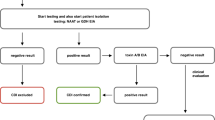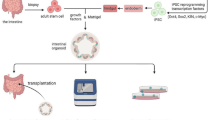Abstract
Resident bacteria have been implicated to play a major role in the development of inflammatory bowel disease. While luminally sterile IL-10 gene-deficient mice remain disease-free, their conventionally raised littermates develop enterocolitis associated with increased numbers of luminal and mucosal adherent bacteria. To investigate the role of defined bacteria on the initiation and development of this enterocolitis, we associated luminally sterile IL-10 gene-deficient mice with pure strains of resident bacteria. Axenic, luminally sterile mice were either monoassociated with viridans group Streptococcus or Clostridium sordellii or co-associated with Bacteroides vulgatus and Clostridium sordellii. Seven to 22 weeks later the mice were analyzed for intestinal histologic injury, epithelial permeability, and an inflammatory immune response to bacterial antigens. Despite optimal colonization none of the tested bacteria caused intestinal inflammation, release of inflammatory cytokines from the epithelia, or disruption of the epithelial barrier integrity. However, in the case of association with Bacteroides vulgatus and Clostridium sordellii, a systemic immune response to bacterial-derived antigens was measured, with a magnitude similar to that seen in conventional sick Il-10 gene-deficient mice. This response was not detected in mice associated with viridans group Streptococcus. We conclude that colonization of the intestinal lumen with individual bacterial species may not be sufficient to alter epithelial barrier integrity, increase intestinal cytokine release, or cause intestinal inflammation in susceptible IL-10 gene-deficient mice, despite the ability of these same bacteria to stimulate a systemic response.
Similar content being viewed by others
References
Casellas F, Aguade S, Soriano B, Accarino A, Molero J, Guarner L: Intestinal permeability to 99mTc-diethylenetriaminopentaacetic acid in inflammatory bowel disease. Am J Gastroenterol 81:767–770, 1986
Dieleman LA, Arends A, Tonkonogy SL, et al.: Helicobacter hepaticus does not induce or potentiate colitis in interleukin-10-deficient mice. Infect Immun 68:5107–5113, 2000
Duchmann R, Kaiser I, Hermann E, Mayet W, Ewe K, Meyer zum Buschenfelde KH: Tolerance exists towards resident intestinal flora but is broken in active inflammatory bowel disease (IBD). Clin Exp Immunol 102:448–455, 1995
Duchmann R, Marker-Hermann E, Meyer zum Buschenfelde KH: Bacteria-specific T-cell clones are selective in their reactivity towards different enterobacteria or H. pylori and increased in inflammatory bowel disease. Scand J Immunol 44:71–79, 1996
Duchmann R, May E, Heike M, et al.: T cell specificity and cross reactivity towards enterobacteria, bacteroides, bifidobacterium, and antigens from resident intestinal flora in humans. Gut 44:812–818, 1999
Duchmann R, Schmitt E, Knolle P, Meyer zum Buschenfelde KH, Neurath M: Tolerance towards resident intestinal flora in mice is abrogated in experimental colitis and restored by treatment with interleukin-10 or antibodies to interleukin-12. Eur J Immunol 26:934–938, 1996
Fox JG, Gorelick PL, Kullberg MC, Ge Z, Dewhirst FE, Ward JM: A novel urease-negative Helicobacter species associated with colitis and typhlitis in IL-10-deficient mice. Infect Immun 67:1757–1762, 1999
Hollander D: The intestinal permeability barrier. A hypothesis as to its regulation and involvement in Crohn’s disease. Scand J Gastroenterol 27:721–726, 1992
Horie Y, Chiba M, Suzuki T, et al.: Induction of major histocompatibility complex class II antigens on human colonic epithelium by interferon-gamma, tumor necrosis factor-alpha, and interleukin-2. J Gastroenterol 33:39–47, 1998
Kim SC, Tonkonogy SL, Balish E, and Sartor RB: Bacterial antigen specific T cell activation precedes intestinal inflammation in Enterococcus faecalis monoassociated IL-10 deficient mice. Gastroenterology 122:A-85, 2002
Kishi D, Takahashi I, Kai Y, et al.: Alteration of V beta usage and cytokine production of CD4+ TCR beta beta homodimer T cells by elimination of Bacteroides vulgatus prevents colitis in TCR alpha-chain-deficient mice. J Immunol 165:5891–5899, 2000
Landers CJ, Cohavy O, Misra R, et al.: Selected loss of tolerance evidenced by Crohn’s disease-associated immune responses to auto- and microbial antigens. Gastroenterology 123:689–699, 2002
Macpherson A, Khoo UY, Forgacs I, Philpott-Howard J, Bjarnason I: Mucosal antibodies in inflammatory bowel disease are directed against intestinal bacteria. Gut 38:365–375, 1996
Madsen K, Cornish A, Soper P, et al.: Probiotic bacteria enhance murine and human intestinal epithelial barrier function. Gastroenterology 121:580–591, 2001
Madsen KL, Doyle JS, Jewell LD, Tavernini MM, Fedorak RN: Lactobacillus species prevents colitis in interleukin 10 gene-deficient mice. Gastroenterology 116:1107–1114, 1999
Madsen KL, Doyle JS, Tavernini MM, Jewell LD, Rennie RP, Fedorak RN: Antibiotic therapy attenuates colitis in interleukin 10 gene-deficient mice. Gastroenterology 118:1094–1105, 2000
Madsen KL, Malfair D, Gray D, Doyle JS, Jewell LD, Fedorak RN: Interleukin-10 gene-deficient mice develop a primary intestinal permeability defect in response to enteric microflora. Inflamm Bowel Dis 5:262–270, 1999
Onderdonk AB, Franklin ML, Cisneros RL: Production of experimental ulcerative colitis in gnotobiotic guinea pigs with simplified microflora. Infect Immun 32:225–231, 1981
Peeters M, Geypens B, Claus D, et al.: Clustering of increased small intestinal permeability in families with Crohn’s disease. Gastroenterology 113:802–807, 1997
Rath HC, Herfarth HH, Ikeda JS, et al.: Normal luminal bacteria, especially Bacteroides species, mediate chronic colitis, gastritis, and arthritis in HLA-B27/human beta2 microglobulin transgenic rats. J Clin Invest 98:945–953, 1996
Rath HC, Ikeda JS, Linde HJ, Scholmerich J, Wilson KH, Sartor RB: Varying cecal bacterial loads influences colitis and gastritis in HLA- B27 transgenic rats. Gastroenterology 116:310–319, 1999
Rath HC, Schultz M, Freitag R, et al.: Different subsets of enteric bacteria induce and perpetuate experimental colitis in rats and mice. Infect Immun 69:2277–2285, 2001
Ruemmele FM, Gurbindo C, Mansour AM, Marchand R, Levy E, Seidman EG: Effects of interferon gamma on growth, apoptosis, and MHC class II expression of immature rat intestinal crypt (IEC-6) cells. J Cell Physiol 176:120–126, 1998
Salomon P, Pizzimenti A, Panja A, Reisman A, Mayer L: The expression and regulation of class II antigens in normal and inflammatory bowel disease peripheral blood monocytes and intestinal epithelium. Autoimmunity 9:141–149, 1991
Sartor RB: The influence of normal microbial flora on the development of chronic mucosal inflammation. Res Immunol 148:567–576, 1997
Sellon RK, Tonkonogy S, Schultz M, et al.: Resident enteric bacteria are necessary for development of spontaneous colitis and immune system activation in interleukin-10-deficient mice. Infect Immun 66:5224–5231, 1998
Steinhart AH, Feagan BG, Wong CJ, et al.: Combined budesonide and antibiotic therapy for active Crohn’s disease: A randomized controlled trial. Gastroenterology 123:33–40, 2002
Sutherland L, Singleton J, Sessions J, et al.: Double blind, placebo controlled trial of metronidazole in Crohn’s disease. Gut 32:1071–1075, 1991
Sydora BC, Tavernini MM, Fedorak RN: Different bacterial strains indigenous to the intestine vary in their ability ot elicit an immune response in an intestinal inflammation. The FASEB Journal 15:A368, 2001
Sydora BC, Tavernini MM, Jewell LD, Wessler A, Rennie RP, Fedorak RN: Bacterial association leads to a rapid inflammatory response and persistance of bacterial immunogenicity in germ-free IL-10 gene-deficient mice. Gastroenterology 120:A521, 2001
Sydora BC, Tavernini MM, Wessler A, Jewell LD, Fedorak RN: Lack of interleukin-10 leads to intestinal inflammation, independent of the time at which luminal microbial colonization occurs. Inflammatory Bowel Diseases 9:87–97, 2003
Turunen UM, Farkkila MA, Hakala K, et al.: Long-term treatment of ulcerative colitis with ciprofloxacin: A prospective, double-blind, placebo-controlled study. Gastroenterology 115:1072–1078, 1998
Author information
Authors and Affiliations
Corresponding author
Rights and permissions
About this article
Cite this article
Sydora, B.C., Tavernini, M.M., Doyle, J.S.G. et al. Association with Selected Bacteria Does Not Cause Enterocolitis in IL-10 Gene-Deficient Mice Despite a Systemic Immune Response. Dig Dis Sci 50, 905–913 (2005). https://doi.org/10.1007/s10620-005-2663-0
Received:
Accepted:
Issue Date:
DOI: https://doi.org/10.1007/s10620-005-2663-0




